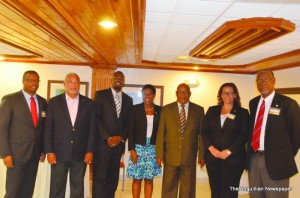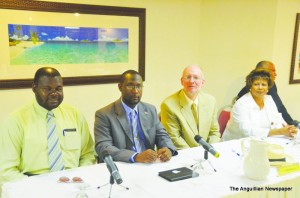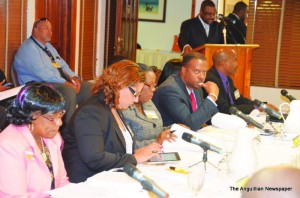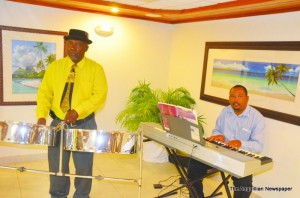

Governor Alistair Harrison and others


Anguilla was the venue for the Eleventh OECS Council of Ministers of Tourism meeting held at Paradise Cove on Thursday, April 25. The discussions focused on the implementation of a Common Tourism Policy for the sub-region, Ease of Travel within the OECS, Sustainable OECS Tourism Projects and Yachting Operations in the OECS.
Apparently noting the individual efforts of the various islands to develop their own tourism industries, OECS Senior Director of Economic Affairs, Randolph Cato, stressed: “We need to recognise that we are not competing with each other, but with other parts of the world.”
He said that according to statistics tourist arrivals in the Caribbean left much to be desired. He pointed out that the dismal statistics showed that the economic viability and sustainability of the tourism sector was at stake.
“As it stands, a disproportionately large amount of energy and resources, time and money, is being expended on certain types of airlift and promotion,” Mr. Cato said. “However, we can spend million and millions of dollars promoting our islands and entering into agreements with airlines – but if we do not give tourists a compelling reason as to why they should visit the OECS, and not South Asia, for example, then we will be wasting our limited financial resources.”
He stressed that each island must be creative and use its own indigenous craft and food to attract tourists. He highlighted Jamaica as one of the places which uses its food and music to woo tourists to that island, and was of the view that the other Caribbean islands should use that example as a model.
Anguilla’s Chief Minister and Minister of Tourism, Hubert Hughes, said each member state should ensure that its individual needs would not overshadow the promotion and development of the OECS as a total tourism destination. “We must seek to develop the region as a destination market focusing on the strength of each destination,” he advised. He commended the OECS Secretariat for its efforts to chart the way in bringing the Caribbean islands together.
Permanent Secretary, Economic Development in Anguilla, Foster Rogers, suggested that member countries of the OECS should develop other pillars of their economies in order to survive the global shocks.
“As much as we would like to diversify our economies in the short term, challenges exist to these initiatives and, in my opinion, that would take some sustained efforts by governments and regional organisations to assist in this regard. This can be done by significant support from international agencies, development partners and administering powers. For many of us, tourism is the only game in town – the goose that lays the golden egg – and the reason we should protect it.”
Mr. Rogers pointed out that a large portion of government revenue was derived from tourism and related activities. He added that while many islands might be criticised for relying too heavily on tourism, in many instances it was the only avenue available for sustainable national development in the short term.
Parliamentary Secretary, Tourism, Haydn Hughes, said there were a number of issues on which the OECS could agree. These included a common tourism policy, yachting operations, ease of travel and airlift capacity in the region. He was grateful that the meeting of the Council of Tourism Ministers was held in Anguilla – one of the most beautiful islands in the region.
Anguilla’s Chief Minister and Minister of Tourism, Hubert Hughes, commended the OECS Secretariat for charting the way in bringing the Caribbean islands together.







